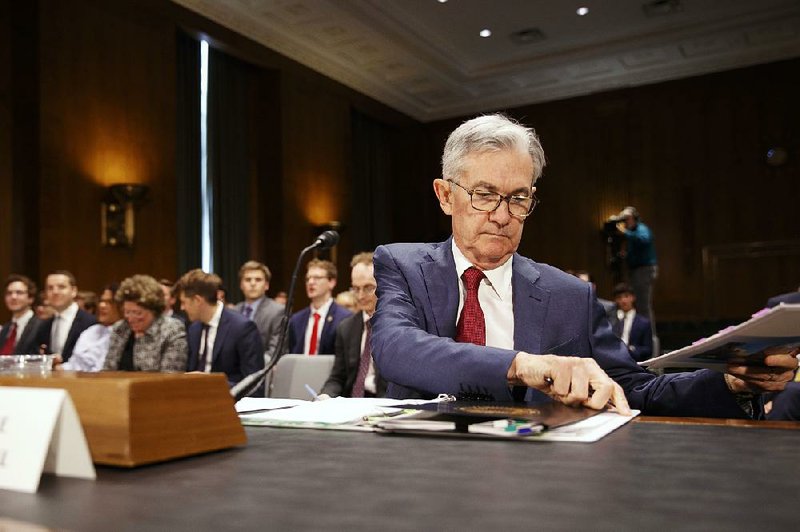WASHINGTON -- Federal Reserve Chairman Jerome Powell, testifying for a second day before Congress, said Thursday that the economy is in a "very good place" despite head winds and that the Fed is prepared to do what it can to "keep it there."
Powell's comments before the Senate Banking Committee strengthened the message he had sent to a House panel Wednesday that the central bank is prepared to cut interest rates to support economic growth.
Powell noted that economic worries, reflected in surveys of business confidence, rose sharply in May. He did not specify what had caused the shock. But in early May trade talks between the United States and China broke down, and President Donald Trump announced that he was doubling tariffs on $250 billion in Chinese goods.
At the same time, the global economy showed further weakness. Powell said these added threats were addressed by the Fed at its June meeting. Since then, job creation, which had slowed sharply in May, has rebounded, and fears of a widening U.S.-China trade war have eased.
"The economy is in a very good place," Powell told the Senate committee. "We want to use our tools to keep it there. It is very important that this expansion continue as long as possible."
Investors expect a quarter-point cut at the Fed's July 30-31 gathering, according to pricing in interest-rate futures, though odds were dialed back a bit after a stronger-than-expected U.S. inflation report earlier Thursday.
Two regional Federal Reserve bank chiefs pushed back Thursday against the idea of a rate cut.
Federal Reserve Bank of Atlanta President Raphael Bostic told reporters after a speech in Atlanta that he's skeptical of the need to cut rates, adding "I am not seeing the storm clouds generating a storm yet." Thomas Barkin from the Richmond Fed said that with unemployment low and consumers spending, it's "hard to make a case for stepping on the gas."
Both regional Fed chiefs, who do not vote this year on the policy-setting Federal Open Market Committee, cited the Dallas Fed's trimmed mean measure of inflation, which has also been highlighted by Powell and has come in more consistently around 2% in recent months. That gauge strips out a certain proportion of items where prices have risen or fallen the most in any given month.
In his Senate appearance, Powell elaborated on the Fed's concerns about persistently low inflation as a reason that there is growing support for rate cuts, citing the problems Japan and Europe are facing in fighting chronically low inflation.
The Fed seeks to keep prices rising at an annual rate of 2%, but it has lagged below that level for most of the current expansion. This year it has fallen farther below that goal.
"You don't want to get behind the curve and let inflation drop well below 2% because what happens is you get into this unhealthy dynamic potentially where lower expected inflation gets baked into interest rates," Powell said.
The Fed raised rates four times in 2018, drawing the ire of Trump, who has called the central bank clueless by pursuing needless rate increases that have slowed economic growth and depressed stock gains.
Much of Trump's criticism has focused on Powell. The president has said he has the power to fire Powell or demote him, something that legal experts dispute.
Asked Wednesday about Trump's threats, Powell repeated that he intends to serve his full four-year term.
Powell received support from lawmakers in the House and the Senate for his efforts to maintain the Fed's independence from political pressure.
Sen. Richard Shelby, R-Ala., told Powell on Thursday, "Thank you for keeping the Federal Reserve independent of both parties. We salute you for that."
In response to questions, Powell said that very low unemployment rates no longer necessarily push up inflation.
"The relationship between unemployment and inflation became weak" about 20 years ago, Powell told the Senate Banking Committee on Thursday. "It's become weaker and weaker and weaker."
Those comments were viewed as another signal that the Fed is feeling more comfortable about keeping short-term interest rates low even though unemployment has fallen to the lowest level in nearly 50 years.
For decades, economic theory suggested that low unemployment -- such as the current jobless rate of 3.7% -- meant that employers would have to raise pay to attract and keep workers, and that would then raise prices to cover higher wage costs.
Many Fed officials believed that required raising rates to slow the economy and prevent a "wage-price spiral" from sending inflation higher.
But Powell said Thursday that he believes the unemployment rate can likely fall much further than in the past without sparking inflation, which means that interest rates also can stay lower.
"I think we're learning all of those things," he said.
Powell said he is unsure how regulators will handle Facebook Inc.'s plan for a digital currency called Libra. He reiterated concerns about the cryptocurrency's potential for fomenting money laundering and financial instability. And he expressed specific worries over customers' privacy.
"There isn't any one agency that can stand up and have oversight over this," Powell told members of the Senate Banking Committee. "The privacy rules that we apply to banks, we have no authority to apply them to Facebook or to Libra."
Powell told committee chairman Mike Crapo of Idaho that the government might need to create a new regulator to address the problem.
"It isn't obvious at all in our current regulatory system that we have in place what we need," he said.
However it's handled, Powell said he doubts all of the questions surrounding the proposal can be addressed and resolved on the timetable that Facebook laid out for debuting Libra by next year, warning against "a sprint to implementation."
Information for this article was contributed by Martin Crutsinger of The Associated Press; and by Craig Torres, Reade Pickert, Steve Matthews, Michael McKee and Jesse Hamilton of Bloomberg News.
Business on 07/12/2019
